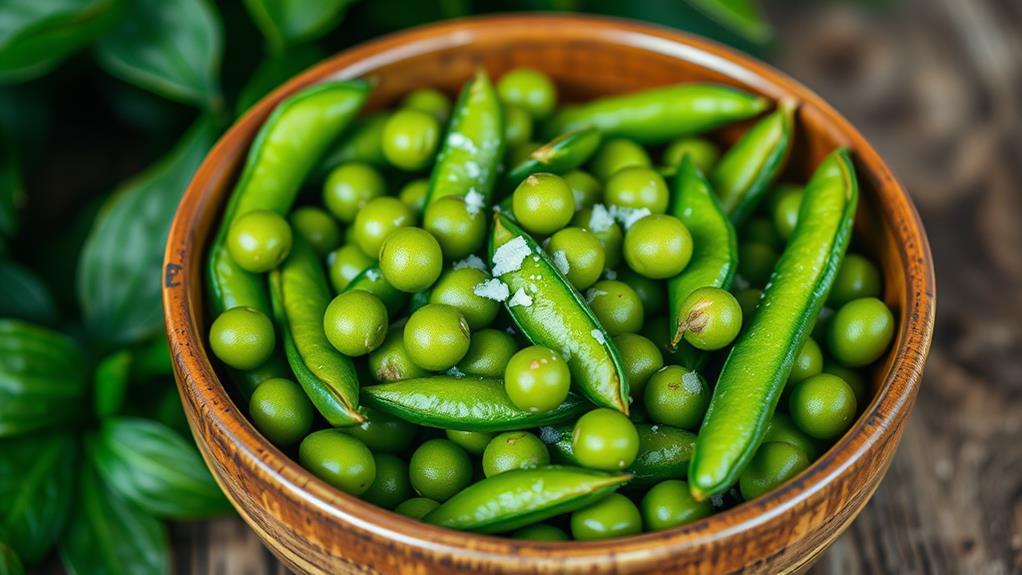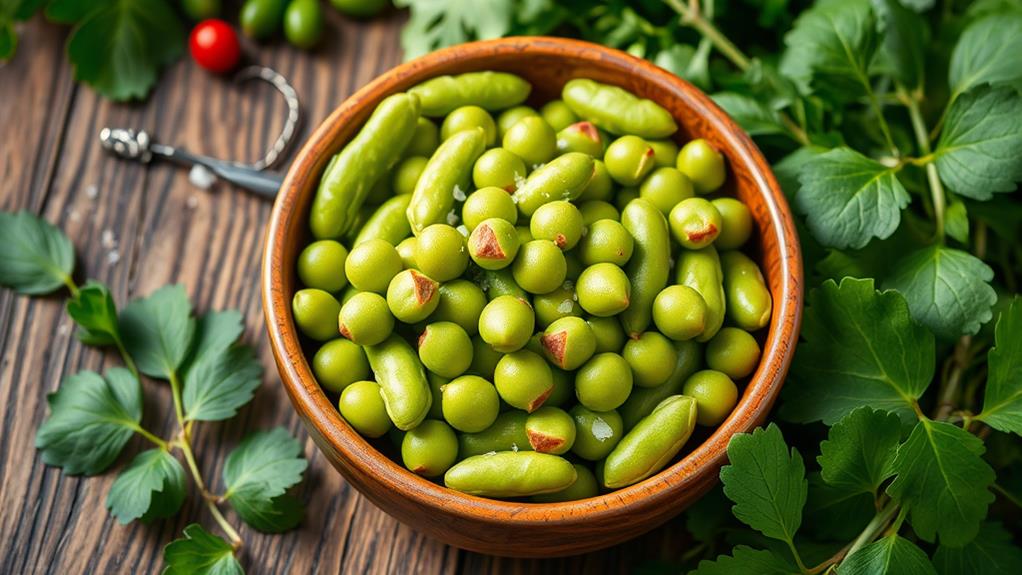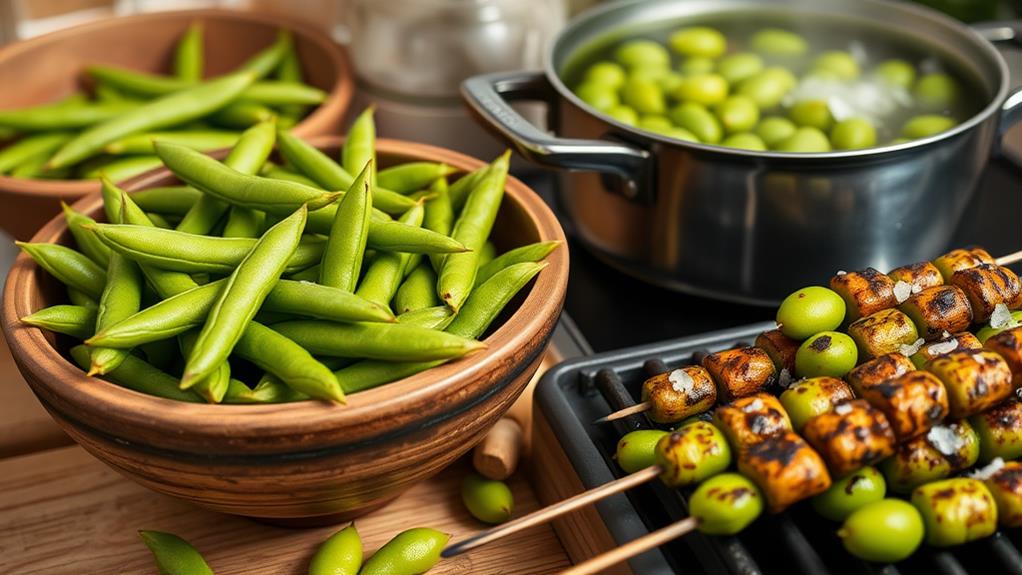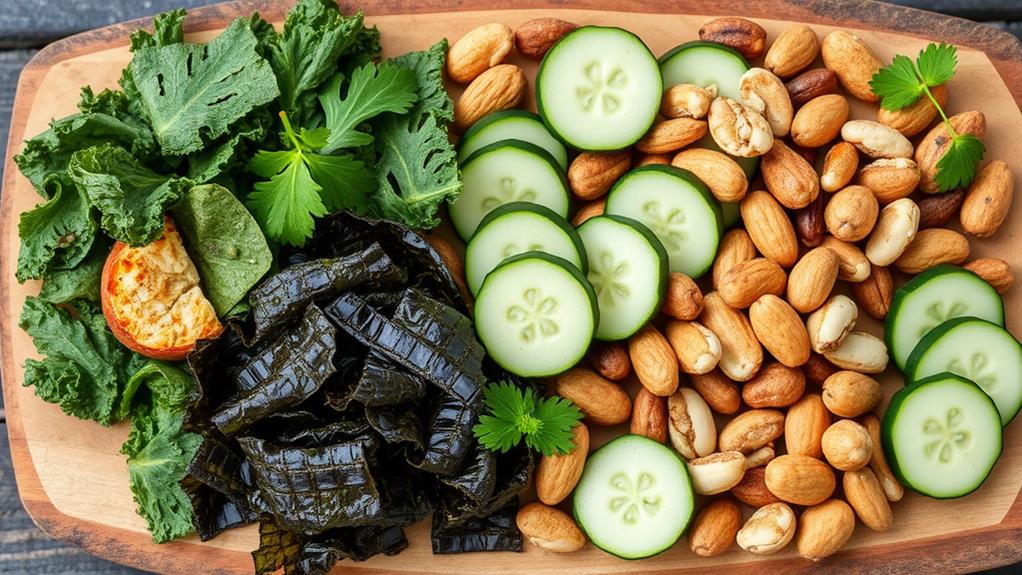Yes, edamame is keto-friendly! With only about 3.6g of net carbs per 100g serving, it fits easily into a low-carb lifestyle. Plus, it's packed with 11g of protein and healthy fats, making it a nutrient-dense snack or meal addition. Just remember that portion control is key; stick to a half-cup serving to keep your carb intake in check. Edamame can be a versatile ingredient in salads, stir-fries, or as dips, while also offering essential vitamins and minerals. Want to know more about incorporating edamame into your keto diet? Keep going!
Understanding Edamame
When it comes to understanding edamame, it's important to recognize that this green snack is the immature form of soybeans and is often enjoyed steamed or boiled.
As a legume, edamame offers several benefits, making it a popular choice among health-conscious individuals. A 100g serving contains about 122 calories, along with 11 grams of protein, providing a satisfying boost to your diet.
Additionally, edamame's low net carb content aligns well with the ketogenic diet, promoting increased fat burning while ensuring you receive essential nutrients. If you're following a ketogenic diet, you'll appreciate the low net carbs per serving—approximately 3.6 grams. This makes edamame a suitable option for those looking to maintain a low-carb lifestyle while still getting essential nutrients.
Beyond its carbohydrate profile, edamame is rich in essential vitamins and minerals, including Vitamin K, calcium, and iron, which contribute to its many health benefits.
However, it's important to be cautious if you have a soy allergy, as edamame can trigger allergic reactions in some people.
Nutritional Profile of Edamame
When you look at edamame's nutritional profile, you'll notice it packs a punch with its macronutrient breakdown, providing a good balance of protein, fat, and carbs.
This makes it a high-protein meat option that can complement a keto diet.
You'll also benefit from its high dietary fiber content, which supports digestion and gut health.
Plus, edamame is loaded with essential vitamins and minerals, making it a smart addition to your diet.
Macronutrient Breakdown
Diving into the macronutrient breakdown of edamame reveals it as a nutrient-dense snack ideal for those on a keto diet. A 100g serving of edamame contains approximately 122 calories, with 11g of protein and 5g of fat, making it a wholesome choice.
Though edamame is a legume, it's low in net carbs per serving, which makes it suitable for keto enthusiasts.
Here's a quick overview of edamame's macronutrient profile:
- Total carbohydrates: 9g per 100g serving
- Dietary fiber: 4.8g per 100g serving
- Net carbs: around 3.6g after accounting for fiber
- Protein: 11g per 100g serving, or 18.5g per cup
- Fat: 5g per 100g serving
With only 5g of net carbs per half-cup serving, edamame fits nicely into your daily carb limits.
Plus, it's rich in essential nutrients like calcium and magnesium.
Dietary Fiber Benefits
Packed with dietary fiber, edamame offers numerous health benefits that make it a valuable addition to your diet. With about 4.8g of dietary fiber per 100g serving, this low carb snack aids digestion and promotes gut health.
When you enjoy a typical serving of shelled edamame (1/2 cup), you're getting around 4g of fiber, greatly contributing to your daily fiber intake recommendations. The slow digestion of the fiber in edamame helps regulate blood sugar levels, making it a low glycemic index food. This is particularly beneficial if you're watching your blood sugar or following a keto diet.
High fiber foods like edamame can enhance feelings of fullness, which assists in weight management by reducing overall calorie intake. Moreover, the fiber in edamame supports the growth of beneficial gut bacteria, promoting a healthy microbiome and potentially reducing inflammation.
Vitamin and Mineral Content
Exploring the nutritional profile of edamame reveals a treasure trove of vitamins and minerals essential for your health. This legume isn't just low in carbs; it's packed with essential nutrients that can enhance your well-being.
In a 100g serving, you'll find:
- 31.4µg of Vitamin K: Vital for bone health and blood clotting.
- 60mg of Calcium: Supports bone strength and overall skeletal health.
- 2.11mg of Iron: Important for red blood cell production and preventing anemia.
- 61mg of Magnesium: Aids muscle function and energy production, potentially reducing migraines.
- 482mg of Potassium: Helps maintain normal blood pressure and heart function.
With a carb count that's friendly for keto diets, edamame contains only a moderate amount of net carbs.
Incorporating edamame into your meals not only boosts your vitamins and minerals intake but also contributes greatly to your overall health.
Is Edamame Keto-Friendly?

Edamame can be a keto-friendly option when consumed in moderation. With approximately 9g of total carbohydrates per half-cup serving, it contains 4g of fiber, resulting in around 5g of net carbs. This makes edamame a relatively low-carb choice for those following the keto diet.
While legumes like edamame are often avoided on strict keto plans, you can enjoy them in moderation without greatly disrupting ketosis. Incorporating nuts and seeds into your diet can also provide healthy fats and protein that complement the nutritional profile of edamame.
A half-cup serving also packs about 10g of protein, which is essential for muscle maintenance and helps keep you feeling full. Additionally, edamame is rich in vitamins and minerals like calcium, iron, and magnesium, supporting your micronutrient needs on a keto diet.
However, portion sizes are important. To avoid exceeding your daily carb limits, be mindful of how much edamame you consume. Overconsumption could lead to disruptions in ketosis, counteracting the benefits of a low-carb lifestyle.
Carb Content Explained
When it comes to carb content, edamame stands out as a low-carb option among legumes. A 100g serving contains approximately 3.6g of net carbs, making it a favorable choice for those on a keto diet.
In addition, many low-carb nuts and seeds, such as almonds, complement edamame well, providing healthy fats and protein. In a typical serving size of 1/2 cup, you'll find about 9g of total carbohydrates, which includes 4g of dietary fiber. This results in a net carb count of around 5g, allowing you to enjoy edamame while staying within your daily carb limit.
Here are some key points about edamame's carb content:
- Low net carbs make it suitable for keto diets.
- High fiber content helps offset carbohydrate load.
- A 100g serving fits well into a 20-50g daily carb limit.
- Moderation is essential to prevent exceeding carb limits.
- Pay attention to portion sizes to maintain ketosis.
Health Benefits of Edamame

Edamame packs a nutritional punch, offering a wealth of protein, fiber, and essential vitamins.
Its low carbohydrate content makes it a great option for those following a ketogenic diet, as it can contribute to the maintenance of stable blood sugar levels while still providing ample nutrients.
Its rich antioxidant content helps combat oxidative stress, supporting your overall health.
Incorporating edamame into your diet can enhance nutrient density while providing protective benefits against chronic diseases.
Nutrient Density Benefits
For those seeking a nutrient-packed snack, edamame stands out with its impressive health benefits. Each half-cup serving provides about 11 grams of protein and 4 grams of dietary fiber, making it an excellent choice for muscle health and digestion.
With its low net carbs, edamame fits well into a keto lifestyle while still delivering a robust nutritional profile.
Here are some key nutrient density benefits of edamame:
- High Protein: Supports muscle growth and repair.
- Rich in Fiber: Aids digestion and helps regulate blood sugar levels.
- Essential Vitamins & Minerals: Offers 20% of your daily iron needs, plus calcium and magnesium for bone health.
- Heart-Healthy Fats: Contains polyunsaturated fats that can improve cholesterol levels.
- Supports Weight Management: The combination of fiber and protein promotes satiety, helping you feel full longer.
Incorporating edamame into your diet can enhance your overall health while keeping your carb intake in check.
It's a delicious, versatile snack that aligns with your health goals!
Antioxidant Properties
Discovering the antioxidant properties of edamame reveals a treasure trove of health benefits. These little green beans are packed with antioxidants, particularly isoflavones, which help reduce oxidative stress and lower the risk of chronic diseases. By incorporating edamame into your diet, you're supporting your heart health too. The antioxidants present can improve cholesterol levels and reduce inflammation, making your cardiovascular system stronger.
But that's not all—edamame's antioxidants, like vitamin C and polyphenols, contribute to your skin health, helping combat signs of aging. As you age, these benefits become even more significant. Additionally, the high antioxidant content may even aid in cancer prevention by neutralizing free radicals that can damage your cells.
Regularly eating antioxidant-rich foods like edamame can enhance your immune system and improve your overall health. By making edamame a staple in your meals, you're not just enjoying a tasty snack; you're also making a powerful choice for your body.
With all these benefits, it's clear that edamame is a smart addition to your diet, especially if you're looking to boost your health while keeping it keto-friendly.
Meal Ideas With Edamame
A delicious way to incorporate edamame into your meals is by steaming it and enjoying it as a nutritious snack. With approximately 9 grams of total carbs and 4 grams of fiber per half-cup serving, it's a keto-friendly option that can fit into your meal plans seamlessly.
Additionally, the protein-rich nature of edamame can help in preserving lean muscle mass, which is essential for maintaining a higher metabolic rate while following a ketogenic diet.
Here are some tasty ideas to include edamame in your diet:
- Salads: Add shelled edamame to your salads for a protein boost and extra texture, contributing around 10 grams of protein per half-cup.
- Stir-Fries: Toss edamame into stir-fries with low-carb vegetables and proteins, creating a satisfying meal that aligns with the ketogenic diet typically limits.
- Dips: Blend edamame into creamy dips or spreads, perfect for veggie platters or as a flavorful snack.
- Avocado Salad: Create a unique keto-friendly edamame and avocado salad, combining healthy fats with plant-based protein for a filling side or light meal.
- Soups: Incorporate edamame into low-carb soups for added nutrition without considerably increasing the grams of carbs per serving.
These edamame recipes can keep your meals interesting while supporting your keto lifestyle!
Preparation Methods for Keto

When preparing edamame for your keto diet, you'll want to stick to steaming or boiling to keep it healthy.
Avoid fried options that can add unnecessary carbs and unhealthy fats.
Plus, eating it right from the pod helps with portion control, making it easier to enjoy without overindulging.
Steaming Vs. Boiling
Choosing the right cooking method for edamame can greatly impact its nutritional value, especially on a keto diet. When deciding between steaming and boiling, consider that steaming preserves more nutrients compared to boiling. This cooking method minimizes the loss of essential water-soluble vitamins and antioxidants.
Here are some benefits of steaming over boiling:
- Better nutrient retention: Steaming keeps more crucial nutrients intact.
- Lower carb content: Steamed edamame maintains lower net carbs, making it more keto-friendly.
- Improved texture and flavor: Steamed edamame has a firmer texture and richer taste.
- Quick preparation: Both methods are efficient, but steaming typically takes just 5-7 minutes.
- Healthier choice: For optimal health benefits, steaming is generally recommended.
While boiling might seem quicker at 3-5 minutes, it can lead to a slight increase in carbohydrate content due to water absorption.
If you're following a keto diet, opting for steaming not only maximizes nutrient retention but also helps you stay within your carb limits.
Avoiding Fried Options
Fried edamame might seem like a tempting snack, but it often comes with hidden pitfalls that can derail your keto diet. When you fry edamame, you typically add unhealthy fats and extra carbohydrates, which can disrupt ketosis. Instead, contemplate boiling or steaming your edamame. These methods preserve its low net carb count—around 3.6g per 100g serving—keeping your diet on track.
By avoiding fried options, you maintain the nutritional integrity of edamame, which is packed with protein (approximately 11g per 100g) and fiber (about 5g). These nutrients not only support your keto goals but also aid in weight management by promoting satiety.
Additionally, eating edamame from the pod can slow down your consumption, making it easier to enjoy this healthy snack without overindulging.
Fried edamame can be calorie-dense due to the oil used in cooking, which might contribute to excess calorie intake. This is especially important to reflect on if you're focused on weight management while following a keto lifestyle.
Stick to healthier preparation methods to fully enjoy edamame's benefits without compromising your goals.
Portion Control Importance
Maintaining portion control is essential for anyone following a keto diet, especially with foods like edamame. A half-cup serving contains 9g of total carbohydrates, which can greatly impact your daily carb intake.
To avoid disrupting ketosis, it's vital to limit your edamame consumption to occasional small portions, ideally around 1/2 cup. While the high fiber content (4g per half-cup) can help offset some carb counts, overconsumption may still lead you to exceed your daily carbohydrate goals.
Here are some tips to help you with portion control when enjoying edamame:
- Stick to a half-cup serving size to keep carbs in check.
- Opt for healthier preparation methods like steaming or boiling.
- Avoid fried or breaded options that increase calorie and carb content.
- Monitor portion sizes when adding edamame to mixed dishes.
- Keep track of your total daily carb intake to maintain ketosis.
Portion Control Tips
When you're incorporating edamame into your keto diet, portion control is essential to stay within your carb limits. A serving of edamame contains about 9g of total carbs and 4g of fiber, giving you roughly 5g of net carbs per half-cup. For strict keto dieters, this means you need to monitor portion sizes carefully, especially if you're aiming to stay under 20g of carbs per day.
To help manage your intake, consider using measuring cups or a food scale to guarantee you stick to that half-cup serving. Larger servings can quickly push your carb count beyond your daily limits.
Pairing edamame with high-fat foods, like avocado or nuts, can help balance your meal and keep you feeling full while managing carbs.
Also, be mindful of any seasonings or sauces you add, as these can contain hidden sugars or carbs, which could increase the overall carb count of your dish.
Alternatives to Edamame

If you're looking for low-carb options to replace edamame in your meals, several alternatives can fit perfectly into your keto diet.
These vegetables not only provide fewer carbs but also support your weight loss goals. Here are some great substitutes:
- Brussels Sprouts: With about 8g of total carbs and 4.5g net carbs per cup, they're versatile and delicious.
- Celery: At only 14 calories and 3 net carbs per cup, celery makes for a crunchy snack or salad addition.
- Asparagus: This veggie has just 4g of carbohydrates and is a great source of prebiotic fiber for gut health.
- Broccoli: Offering 31 calories and 4g of carbs per cup, broccoli is nutrient-dense and may even inhibit cancer cell growth.
- Leafy Greens: Spinach and kale are low in carbs and rich in vitamins, making them excellent choices to incorporate into your meals.
These alternatives not only help you stay within your carb limits but also bring a variety of flavors and nutrients to your diet.
Enjoy exploring these options as you navigate your keto journey!
Final Thoughts on Edamame
Edamame can be a nutritious addition to your keto diet, offering a balance of protein and fiber while keeping carbs relatively low. With about 9 grams of total carbohydrates per half-cup serving and 4 grams of fiber, you're left with approximately 5 grams of net carbs, making it relatively keto-friendly in moderation.
Although edamame is a legume, which some strict keto dieters shy away from, you can still enjoy it in small portions without greatly disrupting ketosis. It provides around 10 grams of protein per half-cup, making edamame a valuable plant-based protein source for your meals.
The high fiber content not only aids in digestion but also helps keep you feeling full, which can be beneficial for weight management on your keto journey.
However, remember that portion control is essential. To stay within your daily carb limit, be mindful of how much edamame you consume.
Conclusion
To sum up, edamame can definitely fit into your keto lifestyle if you manage your portions wisely. While some might worry about its carb content, remember that it's rich in protein and fiber, which can help balance your meals. Plus, its health benefits make it a nutritious choice. By incorporating edamame in moderation, you can enjoy its delicious flavor and texture without derailing your keto goals. So go ahead and savor this tasty treat!







